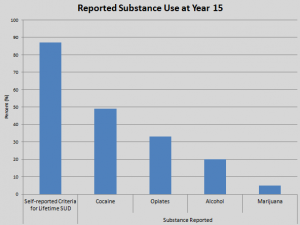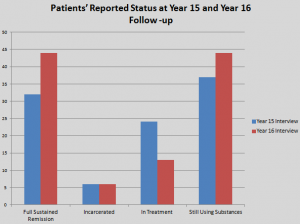The Relationship Between Recovery & Health-related Quality of Life
Researchers have examined using “substance use” as a single measure of recovery, however, there has been much less research focusing on defining, validating and measuring the concept of “recovery” as it has moved from being abstinence-only to now including strategies for living sober across many aspects of life.
Individuals with substance use disorders (SUD) often report poorer health-related quality of life (HRQol).
This study by Garner and colleagues tested a new model looking at a multidimensional measure of recovery, and examined how that measure relates to HRQol.
The Pathways to Recovery Study, an ongoing study since 1996 provided the data for this research. The dataset includes 1,326 adults recruited from a network of 22 substance use disorder (SUD) treatment programs in Chicago, and who reported alcohol or drug use in the past 6 months. The researchers focused on participants who had completed follow-up interviews at both the 15 year and 16 year time points (n=1,008). The sample was predominately female (63%), African American (90%) with an average age of 48 (SD=7.3). Additionally, 87% self-reported criteria for lifetime SUD, including cocaine (49%), opiates (33%), alcohol (20%), and/or marijuana (5%). At the 15 year interview, 32% were in sustained remission (no symptoms for past-year), 6% were incarcerated, 24% were in treatment and 37% were still using. At the 16 year interview, 44% were in sustained remission, 6% were incarcerated, 13% were in treatment and 44% were still using.
The multi-dimensional model of recovery used included:
- psychological problems
- medical problems
- sobriety
- satisfaction with environment
- satisfaction with relationships
- daily functioning
The researchers found that this model of recovery was a good fit based on the data that was gathered.
The factors that were included in this model all appear to represent a previously unidentified common dimension of recovery. The model also was a significant predictor of changes in HRQoL during the subsequent year.


HRQol was found to improve with abstinence, yet, abstinence only explained a very small part of the model. This suggests that sobriety alone is not a sufficient measure of recovery.
IN CONTEXT
There are currently few assessment measures that capture the broad construct of addiction “recovery”. This long-term prospective study represents an important step in that direction. Given the characteristics of the sample, however, broader generalizability of the findings is unclear and more research will be needed to determine the utility of the measure more generally.
CITATIONS
Garner, B. R., Scott, C. K., Dennis, M. L., & Funk, R. R. (2014). The relationship between recovery and health-related quality of life. Journal of substance abuse treatment, 47(4), 293-298.

